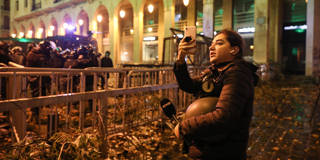Egypt and Saudi Arabia have shown that, when a government lacks legitimacy, its best chance of holding onto power is by suppressing unfavorable information. But the experiences of Iraq and Lebanon suggest that this approach has limits in political systems that depend on power-sharing arrangements.
SYDNEY – Since 2018, large antigovernment protests – what some term the Arab Spring 2.0 – have reverberated across the Middle East. Protesters decry corruption, sectarianism, and economic stagnation. Like the Arab uprisings a decade ago, these protests have successfully unseated key leaders – prime ministers have resigned in Lebanon, Iraq, and Jordan, and long-term dictators were toppled in Sudan and Algeria.

SYDNEY – Since 2018, large antigovernment protests – what some term the Arab Spring 2.0 – have reverberated across the Middle East. Protesters decry corruption, sectarianism, and economic stagnation. Like the Arab uprisings a decade ago, these protests have successfully unseated key leaders – prime ministers have resigned in Lebanon, Iraq, and Jordan, and long-term dictators were toppled in Sudan and Algeria.